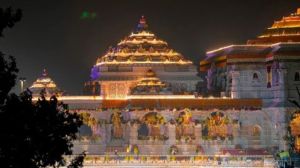Ram temple
The construction of the Ram Temple in Ayodhya has been a long-standing and contentious issue in Indian politics and society. The temple, dedicated to Lord Ram, holds immense cultural and religious significance for millions of Hindus in India and around the world. It has also been a focal point of political discourse, involving key players such as Prime Minister Narendra Modi, the Bharatiya Janata Party (BJP), the Rashtriya Swayamsevak Sangh (RSS), and the Vishva Hindu Parishad (VHP).
The dispute over the site in Ayodhya dates back several centuries, with Hindus believing it to be the birthplace of Lord Ram and the location of a temple that was destroyed in the 16th century by the Mughal emperor Babur. The issue came to the forefront of Indian politics in the 1980s when the VHP, an affiliate of the RSS, launched a campaign to reclaim the site and build a grand temple dedicated to Lord Ram. This campaign ignited a fervor among Hindus who believed in the restoration of the temple.
The political journey of the Ram Temple issue has been closely intertwined with the rise of the BJP, a right-wing political party with strong links to the RSS. The BJP, under the leadership of leaders like Atal Bihari Vajpayee and Lal Krishna Advani, made the construction of the Ram Temple a central plank of its political agenda. The movement culminated in the destruction of the Babri Masjid in 1992 by Hindu extremists, leading to widespread violence and communal tension.
Subsequently, the issue remained a key point of contention in Indian politics, with various court cases and negotiations taking place over the years. In 2019, Prime Minister Narendra Modi's government, with a resounding electoral victory, made significant strides in resolving the dispute. The Supreme Court of India, in a landmark judgment, ruled in favor of the construction of the Ram Temple and allocated a separate piece of land to the Muslim community for the construction of a mosque.
The Ram Temple in Ayodhya holds immense cultural importance for Hindus, who consider Lord Ram as a revered deity and a symbol of righteousness. The temple complex, designed in an architectural style reminiscent of ancient Indian temples, is expected to be a grand tribute to the cultural and religious heritage of the country. Its construction is seen as a fulfillment of a long-cherished dream for millions of Hindus.
The Ram Temple project also aims to promote tourism and boost the local economy in Ayodhya, turning it into a prominent pilgrimage destination. It symbolizes the revival of India's ancient cultural traditions and heritage.
The construction of the Ram Temple in Ayodhya has been a journey marked by political maneuvering, legal battles, and social tensions. It reflects the complex interplay of politics and religion in India, with the BJP, RSS, and VHP playing pivotal roles in the push for the temple's construction. While it holds deep cultural significance for Hindus, it has also been a source of controversy and division in Indian society.
As the temple takes shape in Ayodhya, it remains to be seen how it will impact India's political landscape and societal dynamics. The Ram Temple stands as a reminder of the delicate balance between faith, politics, and the rule of law in a diverse and pluralistic democracy like India.
Ram temple News
Advertisement
Ram temple Photos
Advertisement
Ram temple Videos
Advertisement
